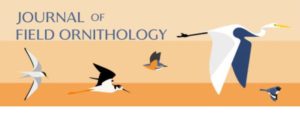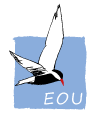Recruiting a new JFO co-editor-in-chief

With a 98-year history (starting in 1925), the Journal of Field Ornithology (JFO) represents one of the longest-published research journals in Ornithology. Starting in 2022, as part of our commitment to lower barriers and increase access, the journal transitioned to a fully digital and open access format through our publishing agreement with the non-profit Resilience Alliance. JFO has one of the lowest article-processing charges among open access journals. Recently, the journal experienced the tragic loss of one of its co-editors-in-chief, Dr. Reed Bowman, leaving our editorial team a large gap to fill.
Published on behalf of the Association of Field Ornithologists (AFO), JFO publishes original articles that emphasize the descriptive or experimental study of birds in their natural habitats. Articles depicting general techniques, emphasizing conservation, describing life history, and/or assessing published studies or existing ideas are appropriate. Contributions are encouraged from throughout the world but must be written in English, however abstracts are translated into one other language for publication. JFO has a historic focus on studies conducted in the Neotropics and those involving participation by nonprofessional ornithologists. AFO’s vision for the future of JFO includes expanding international contributions and identifying and removing barriers by non-traditional ornithologists.
Here we invite you to apply to join this history and publishing tradition as the next co-editor-in-chief of JFO for an initial 4-year term, re-confirmed annually by the AFO Council. You will be joining current co-editor-in-chief, Dr. Mark Hauber, of the City University of New York who has been in this role for two years now.
As co-editor-in-chief, you will be able to lead JFO in becoming increasingly important within the field of ornithology, by broadening its international scope and making a global impact. You will be able to recommend feature issues and solicit review articles. Work-load consists of assessing 50% of the submitted papers (ranging from about ~6 to 12 per month) for quality and suitability for peer review. You will then either assign the paper to be handled by an Associate Editor (a pool of ~12-15 AEs) or handle the paper yourself as editor, recruiting peer-reviewers directly. All final decisions about rejection/revision/acceptance lie with the co-editors-in-chief, whether the paper was handled directly or through an AE. You will also be involved in discussing publication matters and journal website issues with the publisher and serve as a member of the AFO Publication Committee and the AFO Council itself. JFO’s publisher is responsible for copy editing manuscripts and AFO offers non-native English speakers with an editorial assistance program, which the editorial board can recommend before, during, or after the review process. Average workload is estimated to be 5-6 hrs per week. There is annual stipend compensation of $5000 for this position. JFO’s current editorial board will offer training and on-boarding. Previous experience as an Associate Editor, Subject Editor, or Editor-In-Chief is desired.
To apply for the position, please submit a 1-2 page cover letter and CV by Jan 31, 2024. In your cover letter, please share any thoughts for your goals as an editor and how being a co-EIC would aid your professional development. The expected start date is May 2024. Feel free to reach out to AFO president Julie Jedlicka with any questions or concerns. The Association of Field Ornithologists is an international not-for-profit society whose objective is to increase engagement in the conservation of the natural world through the scientific study and enjoyment of wild birds. AFO recognizes that barriers to participation and inclusion exist and is committed to creating and fostering opportunities for people from diverse backgrounds to participate at all levels of the organization. AFO and its affiliated publication, JFO, welcome contributions from researchers and bird enthusiasts of any ethnicity, cultural background, color, age, gender identity or expression, and socio-economic situation.

Recent Comments